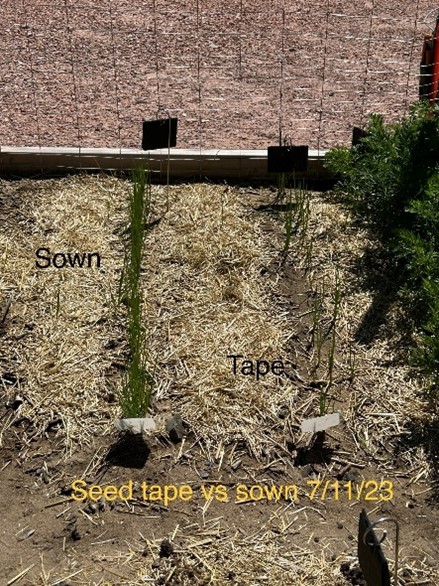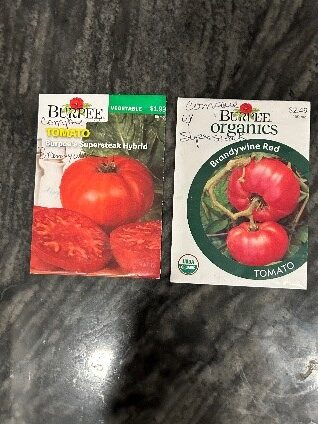Come visit the garden!
- Cheyenne-Arapaho Park is located at 9200 E Iowa Ave, Denver, CO 80247.
- CO Master Gardener hours Tuesdays 8:00 a.m. – 10:00 p.m. All other days will be 1 hour shifts to water. Please attend a brief training at the beginning hour of Tuesday or Friday on your first watering shift. This is a hand water only garden.
- Contact us: By Email or phone at 303-730-1920.
The garden is not open to the public; however, the public is welcome to come during these hours to ask questions and chat. This is a demonstration garden that will focus on education, conduct informative growing demonstrations, and focused topic learning presentations open to gardeners and the public. QR codes will be available to inform and follow progress online on this webpage.
This is a collaborative project between Arapahoe County Open Space, Denver Urban Gardens, and CO Master Gardener program. If you are interested in renting a plot, please contact DUG.
2023 Demonstrations
Demonstration A, B, C Seed tape vs. Sowing seed



Do seed tapes save money? Time? Produce more or less crops (yield) than traditional methods? We’ll find out in this demonstration where we will plant 3 different crops; A: Bunching Onions ‘Parade,’ B: Carrot ‘Kaleidoscope Blend’ and, C: Radish ‘Cherry Belle’, One row is planted with a ready-made seed tape and another row with traditional seeding method. Seedlings will be thinned to recommended spacing with the traditional seeding method. Germination, time spent and yield will be measured with each method.
Updates: Seed Tape vs. Sowing Seed
RADISH Demo C There was no appreciable time difference in the time to sow the radishes verses using seed tape. The seed tape radishes were in clusters of three seeds. Thinning was to 1” as recommended. Thinning was more time consuming with the seed tape (11 min. vs. 6 mins.). Total harvest: Seed Tape: 5#, 77 radishes Hand Sown: 5.75#, 43 radishes
CARROTS Demo B There was no appreciable time difference in the time to sow seeds vs. using seed tape. Thinning was to 1” as recommended. The time to thin the seed tape row was 1:54 minutes removing 19 plants; the time to then the hand sown row was 2:30 minutes removing 47 plants. Total harvest: Seed tape: 5#, 32 carrots Hand sown: 4#, 17 carrots
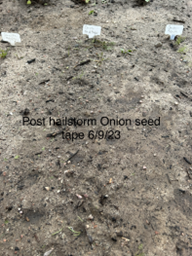
BUNCHING ONIONS Demo A The seed tape onions did not germinate as well as the sown onions. The thicker planting of the hand sown onions assisted in survival and post vigor of the 6/9/23 hail storm. We elected to not thin the bunching onions.
CONCLUSION: SEED TAPE VS. SOWING Demo A, B, C There was no appreciable time savings in hand sowing verses seed tape when planting. Time saved in thinning depended upon the crop; spending more time to thin when the seeds were small (carrots) and potentially less time to then when the seeds were larger; depending upon the seed construction within the seed tape such as the case of radishes being placed in clusters of three on the seed tape. Seed tape crops produced smaller produce, while the sown crop produced larger per unit produce. Weights varied depending upon the crop. As to whether using seed tape or hand sowing crops saving money, that may be a personal choice and dependent on the size of the seed, and the number and size of produce desired.
Demonstration D Heirloom vs. Hybrid
We will compare growth, vigor, yield of each tomato variety. We will grow side by side with the same care, fertilization, and planting method. Each harvest will be counted and weighed. We will hold a blind taste test with the gardeners ranking flavor, texture, skin, and juiciness. Ongoing updates, photos, and videos will be posted on the website. We will compare Brandywine Red (Heirloom) and Burpee Supersteak (Hybrid).
Update
Heirloom vs. Hybrid 7/25/23 Heirloom ‘Brandywine’ (left) is robust with good leaf coverage and is taller than the Hybid. Hybrid ‘Supersteak’ (right) has less vigor, leaves curling up possibly due to stress, and stands at about half the height. We shadow planted similar varieties after a hail storm (Yes, even master gardeners can panic); however, the root system of the plants were strong and they came back and outgrew the shadow planting in the case of the Heirloom, but not the Hybrid. Original plantings became crowded with the shadow plantings and we removed the shadow plantings and transplanted them into another garden plot (We’ll see how they do, but let’s say they weren’t very happy about it!). The Heirloom continues to outgrow the Hybrid and shows much vigor.





CO Master Gardener Evelyn weaves twine between wooden stakes to support the plant. Called the “Flordia Weave” this type of staking allows plants to be planted closer together (24” apart) and provides good air circulation for healthy plants. The Heirloom plant is almost twice the size of the Hybrid. To be continued….. we will measure the produce and yield of each plant and perform a blind taste test at a future (which we hope is soon!!) date.
Demonstration E Three Sisters



Did you know that corn, beans, and squash are called the “Three Sisters”? A number of Native American tribes interplanted this trio because they thrive together, much like three inseparable sisters. We will plant Three Sisters according to Native American methods. Here’s how to plant your own Three Sisters Garden and learn more about the symbiotic relationship: https://tra.extension.colostate.edu/wp-content/uploads/sites/9/2017/05/22.3Sisters.pdf
There are several legends surrounding the Three Sisters. Here is the Cherokee Tribe version: https://www.oneidaindiannation.com/the-legend-of-the-three-sisters/
Update
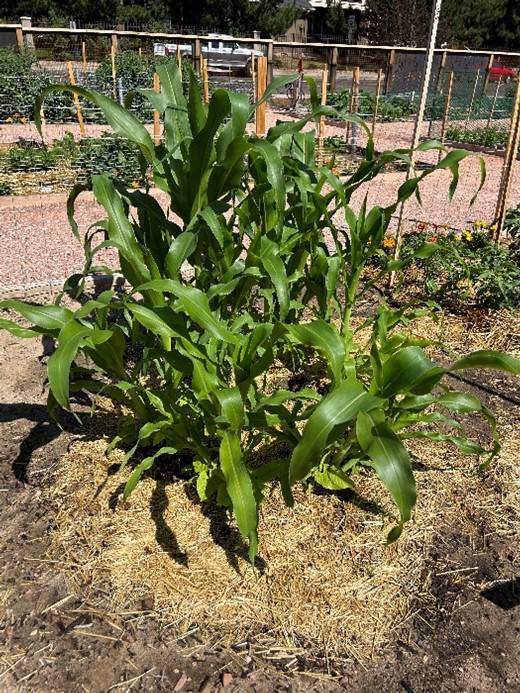
Three Sisters planting. The pole beans are being shaded by our vigorous corn. 64 day hard squash planted 7/25/23.
Demonstration F When to Plant Tomatoes



A traditional planting time for garden transplants is Mother’s Day. In 1914 President Woodrow Wilson signed a bill designating Mother’s Day as the second Sunday in May. Mother’s Day can occur as early as May 8 and as late as May 14th. The nearest climate station to Cheyenne-Arapaho Park is the Cherry Creek Dam at a altitude of 5646’ projecting frost dates from October 2nd – May 12th for 2023, marking a growing season of 142 days. Estimates are based on historical climate data with the probability of frost occurring at 30%. Frost dates have considerable variations and occur when the air temperature reaches 32°, and may also occur when air temperatures are above freezing and exposure factors such as a clear night sky, micro climates, topography, and weather events may occur. Further information can be obtained from NOAA’s National Centers for Environmental Information. The following temperature ranges can impact garden plants:
Light freeze 29° – 32° tender plants killed
Moderate freeze 25° – 28° widely destructive
Severe freeze 24° or colder heavy damage
A frost is not the only consideration as soil temperatures also impact garden plants. To learn more: https://planttalk.colostate.edu/topics/soils-amendments-composting/1626-soil-temperatures-frosts-planting-dates/
Demonstration F will plant the same variety of tomato on Mother’s Day and a second planting of the tomato variety after three consecutive days of night temperatures reaching 55° or more. This generally occurs in late May or early June. This strategy is upon recommendation of researched data from CSU https://cmg.extension.colostate.edu/Gardennotes/717.pdf. Cool temperatures can stunt the plant’s growth and reduce the yield. We will compare the plant’s growth and track the production and yield of each tomato plant.
Seeds sown April 7, 2023 and April 21, 2023
Update
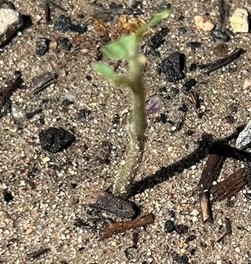
The Mother’s Day planting goes through its first known hailstorm 5/30/23. The comparison planting was also planted on 5/30/23.
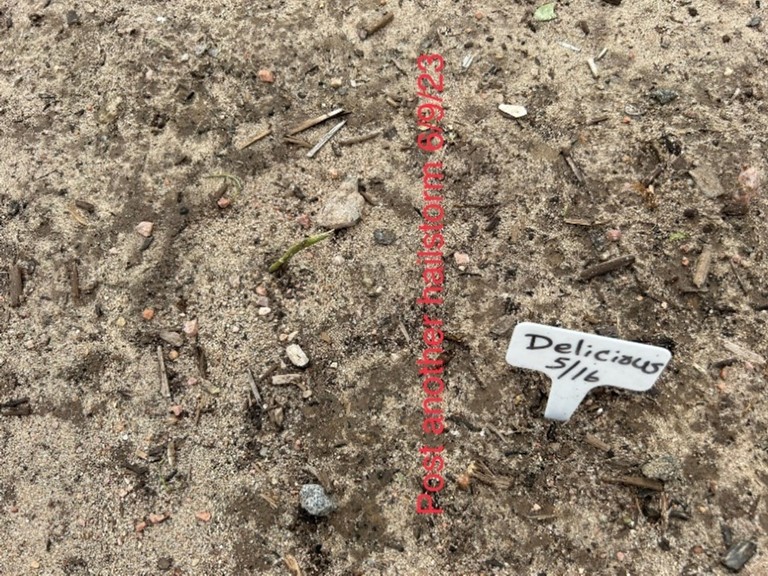
Similar to ‘Where’s Waldo’ taken on 5/30/23, this pic is taken on 6/9/23 post another hailstorm. There are no leaves; however, the stem can photosynthesize and continue to produce food for the plant. Fertilized with NPK of 5-5-5.
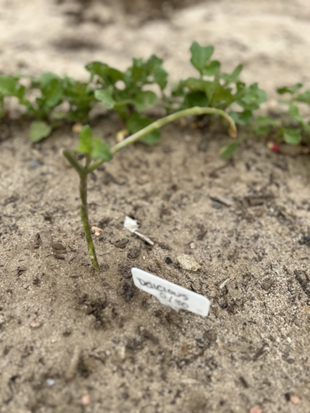
Our companion tomato planted on May 30, 2023, post hail storm. This picture is taken on June 20, 2023.
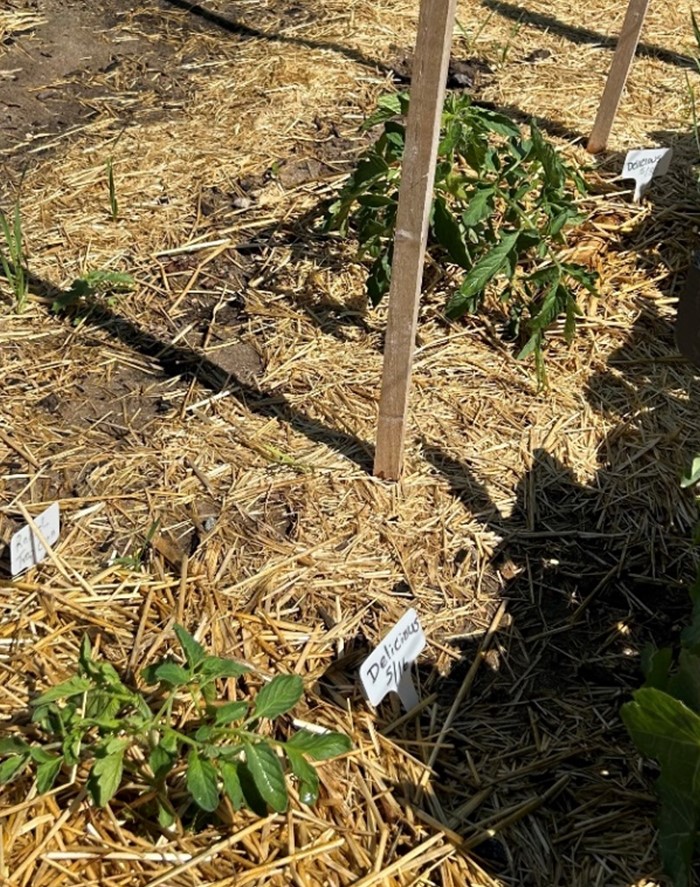
Recovery for both Mother’s Day and comparison planting on 7/18/23. The 5/30 comparison planting growth is almost double of the recovered 5/16 planting. But kudos to our ‘Little Waldo’ for coming back strong!!
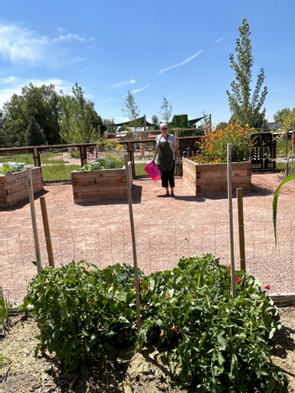
On August 8, 2023, the Mother’s Day and comparison tomato plants are almost equal in size. The comparison planting is slightly taller and fuller than the Mother’s Day planting. The comparison planting is slightly greener. But, kudo’s to ‘Little Waldo’ for doing a fine job catching up.
Moral to the story? We can surmise that the root system of the Mother’s Day planting continued to be hardy and allowed ‘Little Waldo’ to hang in there. Will it’s yield be impacted?
We aren’t quite done yet. Now we will compare the production and yield from each plant. To be continued……



Follow us on Facebook and Instagram.
Horticulture Resources
- Garden Buzz Archives
- CSU Extension Resources
- Colorado Master Gardener Program
- Foothills to Plains Native Plant Master Program
- Native Bee Watch Community Science Program
- The Co-Hort Blog
- PlantTalk Colorado
- Soil Testing
- Plant Select
- Emerald Ash Borer
- Japanese Beetle
- Colorado State Forest Service
- Ask an Expert


